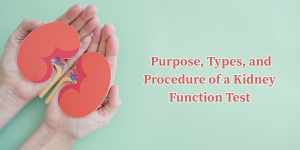
Kidneys play a vital role in filtering waste, balancing electrolytes, and maintaining overall fluid balance in the body. A kidney function test helps assess how effectively your kidneys are performing these essential tasks. Early detection of any dysfunction allows for timely medical intervention, reducing the risk of chronic kidney disease or kidney failure.
Purpose of Kidney Function Tests
The main goal of a kidney function test is to evaluate how well your kidneys are filtering blood and removing toxins. These tests are recommended if you experience symptoms such as swelling in the feet, fatigue, changes in urination, or high blood pressure.
At the best hospital for kidney treatment in India, doctors use advanced diagnostic tools to detect early signs of renal disorders and recommend accurate treatment plans to preserve kidney health.
Types of Kidney Function Tests
Kidney function can be assessed through several types of tests, each serving a unique purpose:
- Blood Urea Nitrogen (BUN) Test: Measures the amount of urea nitrogen in your blood. High levels may indicate reduced kidney function.
- Serum Creatinine Test: Evaluates how well kidneys filter creatinine, a waste product from muscle metabolism.
- Glomerular Filtration Rate (GFR): Estimates how efficiently your kidneys filter blood each minute.
- Urinalysis: Detects abnormalities such as protein, blood, or infection in the urine.
- Urine Albumin-to-Creatinine Ratio (UACR): Measures the amount of albumin (a protein) in your urine to detect early kidney damage.
Each test provides valuable insights into the overall functioning of your kidneys and helps determine if further evaluation is needed.
Procedure of a Kidney Function Test
The procedure for kidney function testing is simple and non-invasive.
- Blood Tests: A small blood sample is drawn from your arm to check BUN, creatinine, and GFR levels.
- Urine Tests: You may be asked to provide a single urine sample or a 24-hour urine collection for a detailed analysis.
These samples are analyzed in the lab to assess filtration efficiency and detect any signs of damage.
Patients visiting the best nephrologist in Ahmedabad can expect a thorough evaluation, accurate interpretation of results, and personalized treatment recommendations based on their test findings.
When Should You Get a Kidney Function Test?
You should consider getting a kidney function test if you:
- Have diabetes or high blood pressure
- Experience swelling in your hands or feet
- Notice changes in urination patterns
- Have a family history of kidney disease
- Are on long-term medications that can affect kidney function
Early testing and expert consultation can prevent severe complications and ensure better kidney health management.
FAQs About Kidney Function Tests
Q1. Is fasting required before a kidney function test?
Not always. However, your doctor may ask for fasting if the test is combined with other screenings.
Q2. How long does it take to get results?
Usually, test results are available within 24 hours, depending on the healthcare facility.
Q3. Are kidney function tests painful?
No, the tests are simple and involve only a small blood or urine sample.
Q4. What happens if test results are abnormal?
Your doctor may recommend further investigations or refer you to a nephrologist for advanced care
Q5. How often should I get my kidney function tested?
If you have diabetes, high blood pressure, or any risk factors, it’s advisable to test at least once a year.
Key Insights
Kidney function tests are an essential part of maintaining good health and preventing serious complications. With accurate diagnosis and timely treatment at the best hospital for kidney treatment in India, patients can manage conditions effectively and improve long-term outcomes. Consulting the best nephrologist in Ahmedabad ensures expert guidance and care tailored to your specific needs.
 :
https://in.pinterest.com/devasyahospital02/
:
https://in.pinterest.com/devasyahospital02/












